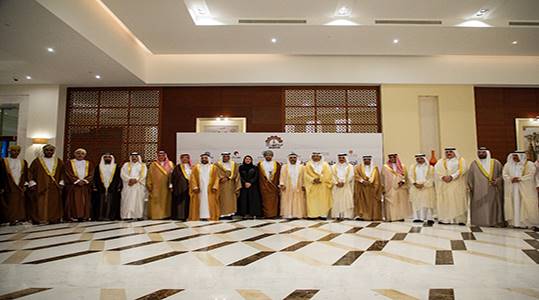The Board of Directors of the Federation of Gulf Cooperation Council Chambers discussed, in its 64th meeting hosted by the Sharjah Chamber of Commerce and Industry at the invitation of the Federation of UAE Chambers, a number of important issues related to enhancing Gulf economic cooperation and benefiting from the various legislative facilities and support provided by the wise leadership of the Gulf Cooperation Council countries to the chambers of commerce, and work to support the Gulf private sector and enhance its contribution to the sustainable economic development process witnessed by the Gulf Cooperation Council countries.
The meeting was chaired by the Chairman of the Federation of Gulf Chambers, Chairman of the Oman Chamber of Commerce and Industry, Faisal bin Abdullah Al Rawas, in the presence of the Chairman of the Board of Directors of the Federation of Chambers of Commerce and Industry in the United Arab Emirates, Chairman of the Abu Dhabi Chamber, Ahmed Jassim Al Zaabi, and the Vice Chairman of the Board of Directors of the Federation of UAE Chambers, Chairman of the Board of Directors of the Sharjah Chamber of Commerce and Industry Abdullah Sultan Al Owais, in addition to the participation of the heads of the Gulf chambers, and a number of officials from the UAE chambers, the Sharjah Chamber, and the Gulf chambers.
The meeting discussed the outcomes of a number of consultative meetings held by the Board of Directors of the Federation of GCC Chambers with government agencies concerned with developing cooperation in the fields of economy, trade, industry, and investment, and the facilities they provide to the private sector in this regard.
Faisal bin Abdullah Al Rawas thanked the government and people of the sisterly UAE, the Federation of UAE Chambers, and the Sharjah Chamber for the warm reception and their efforts in organizing this meeting, which comes at a time when the Federation is witnessing positive changes in its relations with the relevant authorities in the GCC countries. The Federation has become an important role in the Gulf economic development process, and today we find great interest from the leaders of the GCC countries in supporting and empowering the private sector. We also see clear interest from the ministers of economic sectors in the GCC countries, especially the ministers of commerce and industry, in involving the private sector in economic issues, enhancing communication with it, and taking into account its views on economic affairs.
Al Rawas pointed out that the Federation of GCC Chambers has achieved many accomplishments during the past period, as 27 challenges raised in the consultative meetings were resolved, and more than 5 initiatives were adopted at the Gulf level, which the Federation presented to those concerned in the GCC countries. In addition to adopting the Union’s proposals to create incentives to support the private sector, the Union also played an important role with the Customs Union to identify the most important challenges facing the growth of intra-trade between the GCC countries, which were approved by the official in the GCC countries and an action plan was developed to accomplish them. The Federation also agreed with those concerned with the General Secretariat to hold specialized economic seminars with the Gulf private sector on issues of the customs union and the Gulf common market.
For his part, Ahmed Jassim Al Zaabi welcomed, in his speech, the heads of the Gulf chambers participating in the meeting, stressing that its convening in the Emirate of Sharjah reflects the UAE’s commitment to strengthening joint Gulf action. Pointing out the importance of the meeting, as it discusses topics and issues of interest to the Gulf private sector, which comes within the UAE’s orientation to strengthen Gulf relations between Emirati business owners and their Gulf counterparts, emphasizing through it our support and assistance to the Federation of Chambers of the Gulf Cooperation Council countries to play the main role in the Gulf economic development and to be a pioneer in representing this vital sector, especially during this period that the Gulf Cooperation Council countries are witnessing and the development and growth under the wise leadership.
In turn, Abdullah Sultan Al Owais stressed that hosting this important meeting by the Sharjah Chamber of Commerce and Industry reflects the emirate’s leading position as a vital business and investment hub in the region, and its commitment to supporting economic integration efforts, enhancing communication and cooperation between the Gulf business community, exchanging expertise and knowledge, and encouraging investment and inter-trade. Pointing out the role played by the chambers of commerce and industry in the GCC countries in enhancing trade cooperation and developing the efforts of the private sector in the Gulf economic activity, pointing out the pioneering role played by the Federation of UAE Chambers and the Sharjah Chamber in driving economic development. By launching qualitative initiatives that contribute to developing key sectors and enhancing joint projects and investments, through organizing economic forums and providing incentive awards for distinguished projects to encourage entrepreneurship at the local and Gulf levels, as part of efforts aimed at enhancing the position of the Gulf Cooperation Council countries on the global economic map.
Chairman of the Bahrain Chamber, Sameer Abdullah Nass, stressed that the Federation of Chambers of the Gulf Cooperation Council countries is working to enhance trade and investment cooperation between the Gulf countries to confront global economic changes and their effects on local markets. Stressing the importance of establishing integrated Gulf industrial partnerships that contribute to the development of various economic sectors, in line with the directives of the leaders of the GCC countries to enhance economic integration and achieve sustainable development.
He stressed that the Chamber is constantly seeking to enhance Gulf economic integration through coordination between member states in various fields and unifying economic and financial systems, stressing the importance of promoting scientific and technological progress through joint projects, and emphasizing the role of the private sector in strengthening the Gulf economy to face challenges.
Source (Federation of GCC Chambers Website, Edited)

